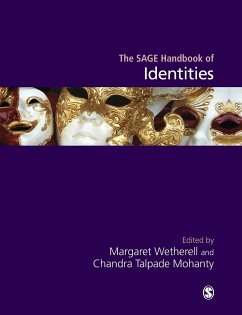Overall, its breaking of disciplinary isolation, enhancing of mutual understanding, and laying out of a transdisciplinary platform makes this Handbook a milestone in identity studies.
- Sociology
Increasingly, identities are the site for interdisciplinary initiatives and identity research is at the heart of many transdisciplinary research centres around the world. No single social science discipline 'owns' identity research which makes it a difficult topic to categorize.
The SAGE Handbook of Identities systematizes this complex field by incorporating its interdisciplinary character to provide a comprehensive overview of its themes in contemporary research while still acknowledging the historical and philosophical significance of the concept of identity. Drawing on a global scholarship the Handbook has four parts:
Frameworks: presents the main theoretical and methodological perspectives in identities research. Formations: covers the major formative forces for identities such as culture, globalisation, migratory patterns, biology and so on. Categories: reviews research on the core social categories central to identity such as ethnicity, gender, sexuality, disability and intersections between these. Sites and Context: develops a series of case studies of crucial sites and contexts where identity is at stake such as social movements, relationships, work-places and citizenship.
- Sociology
Increasingly, identities are the site for interdisciplinary initiatives and identity research is at the heart of many transdisciplinary research centres around the world. No single social science discipline 'owns' identity research which makes it a difficult topic to categorize.
The SAGE Handbook of Identities systematizes this complex field by incorporating its interdisciplinary character to provide a comprehensive overview of its themes in contemporary research while still acknowledging the historical and philosophical significance of the concept of identity. Drawing on a global scholarship the Handbook has four parts:
Frameworks: presents the main theoretical and methodological perspectives in identities research. Formations: covers the major formative forces for identities such as culture, globalisation, migratory patterns, biology and so on. Categories: reviews research on the core social categories central to identity such as ethnicity, gender, sexuality, disability and intersections between these. Sites and Context: develops a series of case studies of crucial sites and contexts where identity is at stake such as social movements, relationships, work-places and citizenship.

